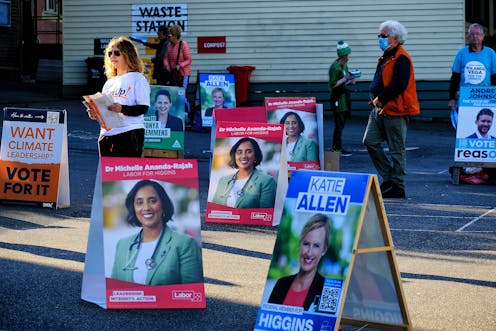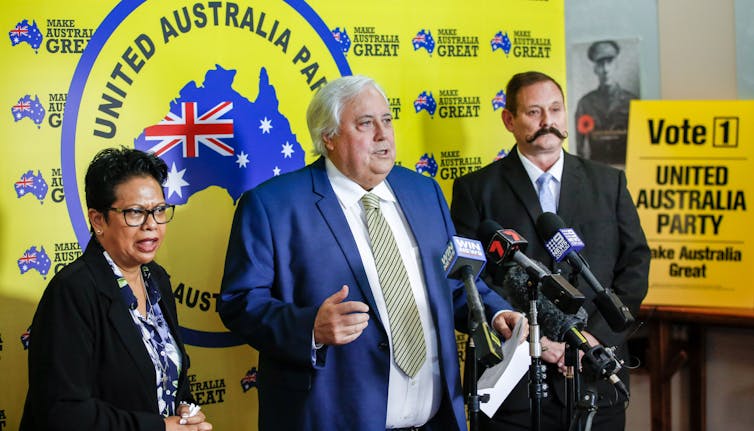
Money in electoral politics is like salt in the human body. Essential for activity – but too much imperils the heart.
Australia’s laws for the financing of national elections are the least developed of any comparable country. The present model marks its 40th birthday this year. In that time, other nations, and most Australian states, have modernised and tightened their laws.
Parliamentary committee recommendations that have just been released – with the endorsement of Labor, Greens and crossbench members – may be the catalyst for change.
What is the current regime? What reforms are proposed? And what are the prospects for lasting reform?
Read more: Sweeping election donation and spending reforms recommended by parliamentary committee
Current rules
The Hawke government laid down the essentials of the present system in 1983. Then, as now, they involve some public disclosure of donations, plus public funding for parties or candidates that receive over 4% of the vote.
Disclosure is meant to achieve transparency around sources of campaign money. Public funding is “clean money”, to defray the cost of electioneering. (It has particularly helped minor parties, which attract few corporate donations.) Together, these measures aimed for improved integrity and a modicum of political equality.
The disclosure net has widened, particularly under the last Coalition government, to cover all sorts of lobby groups that electioneer. But at most it only requires annual reporting.
The net is also replete with holes. Parties only have to disclose “gifts” over $15,200 a year. Smaller donations, for federal electioneering, may be given anonymously to each division of a party.
Worse, the Liberal and Labor parties charge six-figure annual sums to join their business “network” or “forum”. The Australian Electoral Commission then lets them decide if that is a “gift” or a valuable purchase. This equates the undemocratic sale of access to politicians to, say, a genuine conference fee.
Public funding started at 30 cents per vote (quaintly, the cost of a stamp for a mailout). It is now over $3.12 per vote. Without limits on spending or donations, it has acted more like bankable seed funding than an incentive to avoid big and possibly dodgy donations.
Proposed reforms
The latest recommendations aim for holistic regulation across four topics. In doing so, they approximate Canada’s system, the most comprehensively regulated of our liberal-egalitarian democratic cousins. The system would also be similar to those that have evolved, over the past 15 years, for state elections in New South Wales and Queensland.
The first topic is transparency. The report recommends that gifts over $1,000 a year to a party – or to a lobby group for electioneering – be disclosed. For greater timeliness, it follows Queensland in proposing “real-time” disclosure.
The second topic is spending limits. These are a must for fairness. For the last two national elections we witnessed the farce of Clive Palmer’s United Australia Party splurging record amounts to drown out its rivals.
Spending limits can rein in that arms race. While the UAP had little formal success, it still distorted the agenda (and vexed many electors).
The third topic is donation caps. As with spending limits, no dollar amount is yet proposed. This gives wriggle room to find a “Goldilocks” figure somewhere between the Greens’ desire for a low cap and what the Liberal-National parties and Climate 200-backed teal independents would prefer.
By comparison, state caps range between $7,000 a year to a NSW party and just $4,320 over a four-year term in Victoria. As with spending limits, it’s important to adjust for the bigger stage of national campaigns.
The freedom of expression of lobby groups also must be accommodated, without letting them dominate. (Unlike parties, lobby groups are neither up for election, nor publicly accountable.)
The final topic is public funding. To compensate for reining in donations, public funding will rise. The report also recommends “administrative funding” for parties, to assist with compliance costs. Taxpayers struggling with the burgeoning cost of living can but hope public funding does not swell to the $8+ per vote enjoyed by ACT parties.

Political prospects
“It’s time for change”, as the old slogan goes. But change to what? The recommendations merely outline a model. It presumably enjoys in-principle government support.
Much needs to be thrashed out over the rest of the year. Whatever bill the government ultimately proposes to the Senate will require the Greens’ and crossbench support, or opposition backing. It is unlikely to attract the latter.
Liberal-National committee members embraced greater disclosure, but at the $8,000-a-year mark, and not more than monthly. They rejected donation and spending caps “as proposed”. Not outright: Liberal MPs felt the sting of being outspent by teal independents in 2022.
Being in opposition, they have a point. Labor will attract extra donations while it wields power. Above all, the Coalition wants the “affiliation fees” of those unions that are part of the Labor Party to be capped like donations. It also worries about unions electioneering in ways that most businesses would not.
Independent MPs Senator David Pocock and Kate Chaney broadly supported the proposals. However, they also want concessions to “recognise barriers” to independent candidates (who lack party infrastructure and nationwide branding) and new parties.
Politics necessarily mixes principle and pragmatics. In the law about politics, pragmatics includes self-interest. Reform, at last, seems likely. Yet, to be lasting, reform should also attract a broad array of parties and even lobby groups.
Graeme Orr has worked on two ARC grants involving political finance issues, including one supported by the Electoral Council of Australia. He currently is an 'expert' member of the NSW Electoral Commission's iVote panel.
This article was originally published on The Conversation. Read the original article.







